Resources Library: Advocates
Start a Search:
How the Earth Didn’t Fly Into the Sun: Missouri’s Project to Reduce Rules in Domestic Violence Shelters
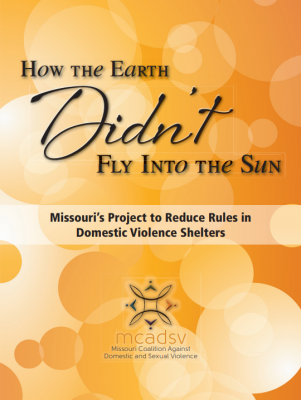
This guide is part of a shared goal between NRCDV, state coalitions, and individual programs to find a better way to welcome women and other domestic violence victims -- many of whom had every aspect of life controlled by their partners -- into shelter where they could experience autonomy despite the constraints of a communal living environment. The concept and conflict of having rules in shelter has been repeatedly recycled and re-silenced throughout the movement to end violence against women. This manual tells how Missouri's project became a living laboratory to answer the question, "What would happen if there weren't rules?"
This first-hand account of Missouri's project to reduce rules in domestic violence shelters offers practical tips for other state Coalitions, programs, and individual advocates interested in this approach. It includes the history of the project, examples of common challenges and successes, and logistics of implementation. Surveys, suggestions and the philosophy the Missouri programs followed are also in this ÒHow-toÓ guide, funded by the National Resource Center on Domestic Violence (NRCDV).
* Access the recording of a lively BlogTalkRadio show where the Missouri Coalition Against Domestic and Sexual Violence (MCADSV) discusses this guide - How the Earth Didn't Fly Into the Sun: Missouri's Project to Reduce Rules in Domestic Violence Shelters [23:08]
Human Trafficking Prevention Toolkit
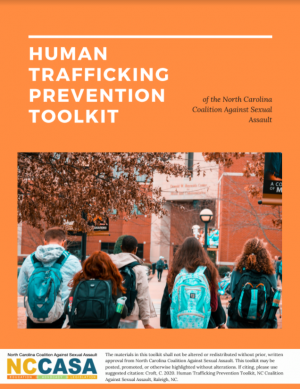
Human trafficking prevention has at times been framed primarily as a criminal justice priority or been siloed from other forms of violence prevention. As experts in sexual violence prevention, NCCASA recognizes sex trafficking as a form of sexual violence and the connection of sexual violence to all forms of human trafficking. NCCASA is pleased to present the Human Trafficking Prevention Toolkit. In this toolkit, you'll find the Human Trafficking Prevention Overview, an overview of what human trafficking is and the public health approach to violence prevention, an exploration of the historical context that informs current frameworks and gaps, tips for effective upstream prevention, and strategies for incorporating a harm reduction lens into your human trafficking prevention work, as well as critical considerations in selecting a prevention strategy.
I Ask - Sexual Assault Awareness Month
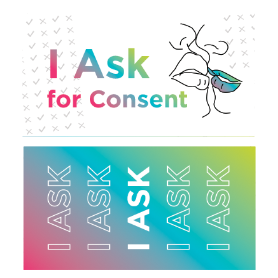
Sexual Assault Awareness Month (observed annually in April) is a campaign to raise public awareness about sexual violence and educate communities on how to prevent it. The campaign theme, I Ask, champions the message that asking for consent is a healthy, normal, and necessary part of everyday interactions. You can download and print materials for your Sexual Assault Awareness Month activities below!
- I Ask for Consent Palm Card and Handout cover the basics of knowing how to ask for and recognize consent. For best graphic quality, download the PDF and then print it out.
- I Ask for Digital Consent Palm Card and Handout discuss the importance of consent in online interactions. For best graphic quality, download the PDF and then print it out.
- I Ask How to Teach Consent Early Palm Card and Handout instructs parents on how to model consent with children in late childhood and early adolescence. For best graphic quality, download the PDF and then print it out.
- I Ask How Power Impacts Consent Palm Cards and Handout looks at the way imbalances of power impact consent. For best graphic quality, download the PDF and then print it out.
For additional resources, visit the National Sexual Violence Resource Center (NSVRC).
I-CAN! Understanding Protective Orders in Richmond, Virginia
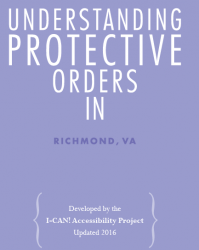
The I-CAN! Understanding Protective Orders in Richmond, Virginia Booklet describes what a protective order is, the types of protective orders, the process of obtaining a protective order in Richmond, Virginia, tips about going to court, what to do after you receive a protective order, and various resources.
Attached is (1) the English version of the booklet, (2) a large print English version of the booklet, and (3) a Spanish version of the booklet.
Immigrant Families & Public Benefits: Under a New Presidential Administration
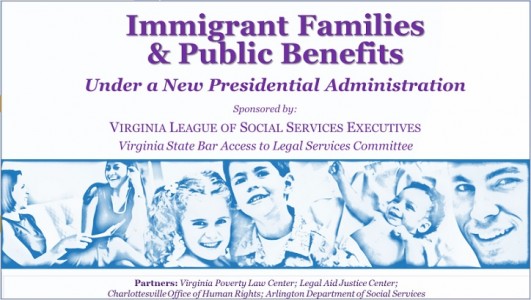
Recent changes to immigration enforcement have resulted in social services agencies across Virginia reporting decreased numbers of immigrant families requesting access to services. Some immigrant families even seek to withdraw their U.S.-born children from crucial benefits for which they are eligible due to fear of immigration enforcement. This PDF document is from a webinar given on March 31, 2017, to discuss changes in the immigration enforcement landscape, its impact on immigrant communities, immigrants' eligibility for public benefits for themselves and their U.S.-born children and strategies to encourage immigrant families to continue to access public benefits for which they are eligible. The webinar was sponsored by the Virginia League of Social Services Executives, Legal Aid Justice Center, Virginia Poverty Law Center and the Virginia State Bar Access to Justice Committee.

